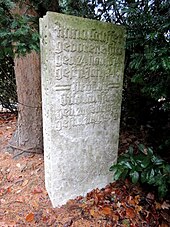Otto Lauffer
Otto Lauffer (born February 20, 1874 in Göttingen-Weende ; † August 8, 1949 in Hamburg ) was a German folklorist and cultural historian .
Life
Otto Lauffer was born in Weende (today part of Göttingen ) and spent his childhood there until 1886 (until 1877 in Schlagenweg 5).
He studied German , history and art history at the Universities of Göttingen (matriculated on August 22, 1891), Berlin , Munich and again in Göttingen (matriculated April 24, 1894). In 1896 he received his doctorate from Moriz Heyne . He was a member of the "student choir of Georgia Augusta" (today StMV Blue Singers ) and the Academic-Musical Association Nordmark Hamburg (in the special houses association ).
In 1902 Lauffer became assistant and in 1907 director of the Historical Museum in Frankfurt am Main . From 1908 until the opening in 1922, he built the Museum of Hamburg History as founding director , which he continued to manage until 1946.
In 1919, when the University of Hamburg was founded, Lauffer was given the first professor of ethnology in Germany, which he held until 1939. His doctoral students include the later National Socialists Herbert Freudenthal and Ernst Bargheer . In 1922/23 he was also rector of the university. In November 1933 he signed the German professors' confession of Adolf Hitler .
Lauffer was buried in Hamburg at the Ohlsdorf cemetery (grave location: R9 (29-30) near chapel 1) and is managed by the cemetery administration among the more well-known personalities. His estate can be found in the Hamburg State and University Library Carl von Ossietzky . A memorial plaque in Weende has been commemorating Otto Lauffer since February 20, 1984.
Otto-Lauffer-Straße in Weende and the steam launch Otto Lauffer in Hamburg are named after him.
work life
From the personal union of the offices of museum director and university professor, the special orientation of Hamburg folklore arose until the period after the Second World War, the focus of which was initially on research into material culture .
As a focus in the area of research and teaching, Lauffer dealt with subject matter topics. In addition to this area, which resulted from the development work of the museum, he also dealt with many other folkloric and cultural-historical areas, especially in house and custom research. To this day he is one of the most important research personalities in the overall history of the subject. His list of publications includes more than 300 titles. In 1951, in his publication Volkswerk, he published a careful accounting using the term "symbol research" popular during the Nazi era.
Fonts
- Ghosts in the tree. In: Folklore gifts. John Meier offered on his seventieth birthday , Berlin: de Gruyter 1934, pp. 104–120.
Individual evidence
- ^ Association of Alter SVer (VASV): Address book. Membership directory of all old men. As of October 1, 1937. Hanover 1937, p. 75.
- ^ Association of Alter SVer (VASV): Address book. Membership directory of all old men. As of October 1, 1937. Hanover 1937, p. 128.
- ↑ Celebrity Graves
- ↑ O. Lauffer: New research on the outer monuments of German folklore. In: Journal of the Verein für Volkskunde 16, 1906, pp. 100–116 and 223–235 ( online ).
- ↑ Symbols: the meaning of the sign in culture
literature
- Bernward Deneke: Lauffer, Otto. In: New German Biography (NDB). Volume 13, Duncker & Humblot, Berlin 1982, ISBN 3-428-00194-X , p. 712 f. ( Digitized version ).
- Norbert Fischer : Lauffer, Otto . In: Franklin Kopitzsch, Dirk Brietzke (Hrsg.): Hamburgische Biographie . tape 3 . Wallstein, Göttingen 2006, ISBN 3-8353-0081-4 , p. 219-220 .
- Gudrun M. König / Elisabeth Timm: "German" things. The Germanist Otto Lauffer between antiquity and folklore . In: Lisa Regazzoni (ed.): Written Pasts. Writing history at its limit - From the early modern era to the present , Berlin: de Gruyter 2019, ISBN 978-3-11-055003-0 , pp. 157–192.
Web links
- Literature by and about Otto Lauffer in the catalog of the German National Library
- Works by Otto Lauffer in the Gutenberg-DE project
- Newspaper article about Otto Lauffer in the 20th century press kit of the ZBW - Leibniz Information Center for Economics .
| personal data | |
|---|---|
| SURNAME | Lauffer, Otto |
| BRIEF DESCRIPTION | German folklorist and cultural historian |
| DATE OF BIRTH | February 20, 1874 |
| PLACE OF BIRTH | Göttingen turn |
| DATE OF DEATH | August 8, 1949 |
| Place of death | Hamburg |

